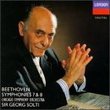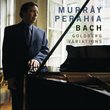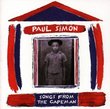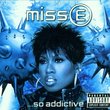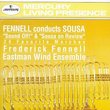| All Artists: Benjamin Britten, London Symphony, Peter Pears, Alfred Deller, Elizabeth Harwood, Stephen Terry, John Shirley-Quirk, Helen Watts, Thomas Hemsley, Josephine Veasey Title: Britten: A Midsummer Night's Dream Members Wishing: 0 Total Copies: 0 Label: London / Decca Release Date: 2/6/1990 Album Type: Import Genre: Classical Styles: Opera & Classical Vocal, Historical Periods, Modern, 20th, & 21st Century Number of Discs: 2 SwapaCD Credits: 2 UPC: 028942566323 |
Search - Benjamin Britten, London Symphony, Peter Pears :: Britten: A Midsummer Night's Dream
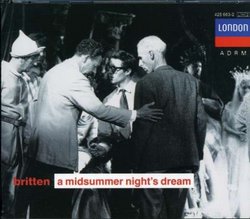 | Benjamin Britten, London Symphony, Peter Pears Britten: A Midsummer Night's Dream Genre: Classical
Britten: A Midsummer Night's Dream (View amazon detail page) ASIN: B0000041WB Binding: Audio CD UPC: 028942566323 |
Larger Image |
CD DetailsSynopsis
Product Description Britten: A Midsummer Night's Dream (View amazon detail page) ASIN: B0000041WB Binding: Audio CD UPC: 028942566323 Similar CDs
Similarly Requested CDs
|
CD ReviewsMORE THAN STANDS UP TO LATER COMPETITION Klingsor Tristan | Suffolk | 10/24/2005 (5 out of 5 stars) "This was the first opera I ever saw live, during its initial London run a few months after the Aldeburgh premiere. I still carry vivid memories of that evening as a magical experience. And magic certainly lies at the heart of this entrancing (almost literally) piece. From the sounds of the forest breathing in the opening string glissandos to the fairies' glittering benediction on Duke Theseus house at the end, Britten conjures a wonderful array of colours and pictures from his relatively modest orchestra. Each group of characters is given its own distinctive orchestral palette - strings with woodwinds predominate for the Lovers, the trombone fills in its fatter, comical tones when the Rustics appear, horns add a touch of regality for Theseus' court and the Fairies sparkle with the inspired combination of Purcellian harpsichord with harp and modern tuned percussion. Puck flits around with a sprightly trumpet always in tow (brilliantly played by William Lang on this recording). But the piece is much deeper and more disturbing than all that surface magic suggests. Britten and Pears extracted one of the most successful of all Shakespearean librettos from the play. They managed to excise the whole of Shakespeare's First Act merely by the addition of their one and only original line (`Compelling thee to marry with Demetrius'). Thus the opera focuses even more than the play on the Wood and the misunderstandings, confusions, dreams, nightmares and, above all, the power of sleep that it brings to all the characters (including, of course, Oberon and Tytania despite their delusions of omnipotence). Sleep with its benign and malign effects was a preoccupation of Britten's throughout his career - from Les Illuminations and the Serenade through Let Us Sleep in War Requiem and Dormi nunc in the Cantata Misericordium to Aschenbach's Dionysian nightmare in Death in Venice. The deepest explorations, though, are contained in the contemporaneous Nocturne and here in the Dream. The key to this is Act 2 of the opera and the four `sleep' chords that open it and on which the whole structure is based. Between them they contain all 12 notes of the chromatic scale. But this is no serial piece. The implicit dissonances can certainly cloud the harmonic air at moments of crisis and conflict, but the key centres implied by each chord can also restore consonance again. And all four chords provide a healing benediction below Puck's `Jack shall have Jill' prophesy at the end of the Act. None of this takes away from the fact that this is, of course, a comedy - it merely serves, as in all great comedies, to deepen the human impact. Much of the opera is very funny - the lovers' confusions, the big quarrel scene and, naturally, much of the Rustics material. The Pyramus & Thisbe play has come in for its share of stick - too arch, too knowing, etc. - but I still find Britten's parodies of grand and bel canto operas funny, especially the way he takes the Michael out of Donizetti. This recording, under the composer's direction, has most things going for it, not least Britten's impeccable pacing of the score. The lovers are a mixed bunch: Veasey and Harper are excellent, Hemsley very good, but Pears is hopelessly miscast as Lysander. Flute was his part in the premiere and was probably the best part for him - he caught `Oh sweet bully Bottom' perfectly. But he is frankly too old, too knowing and the wrong voice for the ardent young lover. Brannigan is by far the best Bottom on disc - as well as all the knockabout stuff, he captures the awe, the wonder and the sense of a life changed by his experiences to perfection in Bottom's Dream. The rest of the Rustics, ably led by Norman Lumsden's Peter Quince, are all worthy of their starring roles in the play as well as in their contributions to the rehearsals. The Fairies are a match for any of their rivals on disc. Deller may lack some of the darker, more menacing side of Oberon's character that James Bowman captures so well, but his singing of the ravishingly Purcellian `I know a bank' is matchless. So, too the late Elizabeth Harwood in all the florid coloratura passages. While Colin Davis and Richard Hickox produce performances of this many-layered opera that make for fascinating comparisons with this first recorded reading, these are still the yardstick discs of Britten's Dream. " A Tour De Force R. Albin | Ann Arbor, Michigan United States | 01/28/2004 (5 out of 5 stars) "This is a really impressive work. Shakespeare's play is long, has a complex plot, and a great deal of complicated language. Adapting this work for an opera would daunt almost anyone. Judicious cuts shorten the work substantially without sacrificing the integrity of the plot or any of the really important episodes. Britten's remarkable ability to shape music for english texts is exercised to its full capacity, and the plot is cleverly reinforced by the music. Britten develops 3 plot strands, the Oberon/Titania conflict, the romantic misadventures of Lysander/Helena/etc., and the story of the rude mechanicals. Each group is provided with distinctive and appropriate music. As the opera progresses, the plots intertwine and the musical styles become intermixed. This is a masterly combination of well developed literary judgement, stagecraft, and musical expression." Definitive. Marcus K. Maroney | 10/25/2004 (5 out of 5 stars) "Another in the line of definitive recordings made by Britten of his own work. A previous reviewer said this recording includes the original cast members, which isn't quite accurate (i.e., Pears created the role of Flute, not Lysander). However, there simply isn't a weak link here, and that's saying quite a bit given the size of the cast. My only wish is that Harper had been cast as Hermia (a more vocally beautiful part perfect for her) instead of Helena (also a nice part, but more anonymous, like Veasey's beautiful but not distinctive voice). It's great that Stephen Terry brings as much characterization to Puck as the singers do the their roles, a problem in Davis' recording. While Alfred Deller's countertenor is a bit more metallic than we're used to nowadays (with Scholl, Daniels and Asawa investing us with expectations of utmost creaminess in a countertenor's sound), the added edge makes Oberon even more sinister. The London Symphony play excellently, with fine trumpet solos accompanying Puck's tumbling and wonderfully transparent and eerie string tone in the forest music. The recorded sound is wonderful, with excellent positioning of characters in their actions on stage. A truly magical recording."
|

 Track Listings (20) - Disc #1
Track Listings (20) - Disc #1
